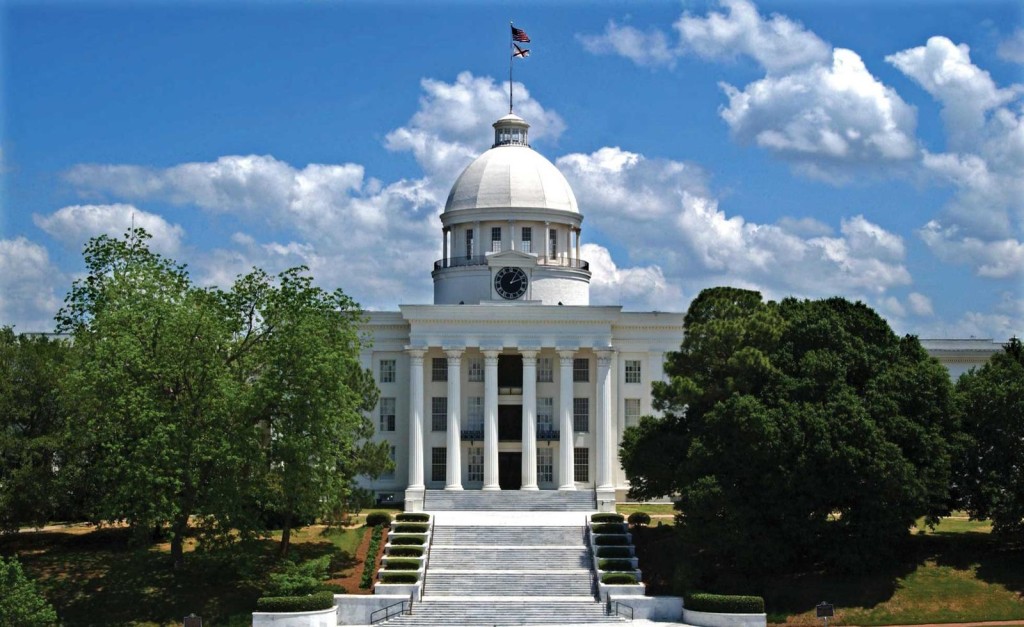Anne Marie Bonds: Juvenile justice – a broken system with harmful effects on Alabama’s youth

A fourteen year old shoplifts cologne from a local Macy’s with hopes to impress his crush. Lacking the skills of an experienced criminal, he gets caught easily. Although perhaps warranting a fine and community service, he is instead processed as a criminal defendant and placed in a juvenile detention center. Here, he crosses paths daily with violent youth offenders. While this specific situation is hypothetical, under Alabama’s current juvenile justice laws the situation is possible and likely. Any minor charged with a misdemeanor can be sent to the same centers as major juvenile offenders. Will that minor come out of the system as an upstanding member of the community or will he or she be likely to commit more violent crimes? Multiple studies find that placing non-violent youth offenders in detention centers actually increases their chances of committing a violent crime later on in life. As one Alabama youth currently in detention stated, “Basically, when you get locked up you learn how to be a better criminal.” Obviously, non-violent youth should not be grouped with violent youth offenders, but under Alabama’s current juvenile justice laws, wayward minors are prosecuted and punished with long detention sentences—away from their families for months and even years—when realistically supervision and probation may be a better option. This only creates more crime in our state, along with more state spending to house these youth offenders; one placement of a youth offender can cost the state up to $160,000 per year. If we want to decrease crime and state spending in Alabama, then we must make juvenile justice reform a priority. In 2017, the Alabama Juvenile Justice Task Force met to determine where the system needs improvement and to make recommendations. What they found was shocking. Over the past five years, there has been a 27% drop in juvenile crime. Even though juvenile crime rates have fallen, the number of youth in detention facilities has risen 6%. This means that the juvenile justice system is becoming more involved in detaining youth, even though there is no correlation between detention and lower crime rates. Not only is the juvenile system becoming more involved in youth correction, but over two thirds of youth offenders in custody are detained for low-level misdemeanors—crimes like shoplifting, fighting in school, and truancy. Instead of detaining non-violent youth, the state should implement more prevention programs and use supervision and probation more often as a punishment, instead of detention, especially for first time offenders. There is currently a bill, the Juvenile Justice Act, in the Alabama Legislature that implements many of these reforms. It acts on the problems within Alabama’s juvenile justice system, working to help wayward youth instead of treating them as if they were violent adult criminals. Fortunately, Alabama can follow the lead of other states who have successfully pursued meaningful juvenile justice reforms. For example, Texas reformed its juvenile system throughout 2007-2011 and disallowed detaining youth in detention facilities for misdemeanors. Texas’s detention rate has, in response, declined by 66%, with no increase in crime. Coincidentally, the state has saved over $179 million over 6 years. Most youth will make mistakes, which is a critical part of growing up and learning how to be an adult. With the current state of Alabama’s juvenile justice system, however, a non-violent crime by a minor offender can turn into a life-ruining mistake. Alabama legislators must support juvenile justice reforms not only because it is in the best interest of our state’s youth, but because Alabama’s future is depending on it. ••• Anne Marie Bonds is Policy Fellow at the Alabama Policy Institute (API). API is an independent, nonpartisan, nonprofit research and educational organization dedicated to strengthening free enterprise, defending limited government, and championing strong families. If you would like to speak with the author, please e-mail communications@ alabamapolicy.org or call (205) 870-9900.
Taylor Dawson: Calling all candidates – let’s talk education

You spoke, Alabama. We asked, what issues are important to you and what questions would you ask of your candidates to answer? Since last week was National School Choice Week, let’s explore questions on promoting education and supporting Alabama’s school children. And it probably won’t come as much of a surprise—Alabamians are very vocal on these issues. Here are a few questions posed by our readers, and some background information for candidates to consider when responding. What are your thoughts on school choice? Historically, Alabama has been slow to embrace school choice. The fight for Alabama’s very first piece of school choice legislation, the Alabama Accountability Act in 2013, was one for the ages. When charter schools were authorized within the first few weeks of the legislative session in 2015, I thought that Alabama was finally embracing school choice, until last session when changes to broaden the AAA suffered a massive defeat. If elected, would you support efforts to broaden school choice opportunities for Alabama families? An innovative way other states are allowing parents to have more choice over their child’s education is through Education Savings Accounts (ESAs). Are you a proponent of ESAs? A brief explanation for those who don’t know what ESAs are: ESAs are private accounts managed by the parents of students for use on their child’s education expenses. Under ESAs, funds that the state would spend on a child at their discretion are now up to the parents’ discretion. Do you agree that Alabama should empower families to customize their children’s education based on their specific needs? An Obama-era policy that’s been largely rejected in Alabama is common core standards. What is your opinion on common core? A policy that would allow the federal government to tell our teachers how and what they’re to teach our schoolchildren has been a hot issue in Alabama since it was introduced. A percentage of Alabama’s current system of standards—“College and Career Ready Standards”—are based on common core. There have been multiple attempts to shake these standards, whether through revising them or bucking them completely to revert to the previous standards. Would you encourage action on these standards? The current Secretary of the U.S. Department of Education Betsy DeVos is a proponent of localizing education as much as possible in an effort to give parents more choice. Do you agree? It’s a common opinion among school choice advocates that parents—not government—should determine the best course for their child’s education. In a speech at Harvard University, Secretary DeVos said, “The future of choice does not begin with a new federal mandate from Washington.” One way to allow localities to take ownership of education is through charter schools, which have a proven record of success nationwide and help reduce barriers to school choice. What would you do to encourage local innovation in education and promote growth of charter schools in Alabama? Last year, the Alabama School Board was surrounded by controversy, and they have nobody to blame but themselves. How would you institute accountability with the board? Alabama’s most recent state superintendent held his office for a year before the education establishment forced him out. Under the previous superintendent’s administration, Alabama’s graduation rates were deemed inflated and misreported by federal officials. Throughout the entirety of 2017, the Board seemed to play politics more than they actually made strides for Alabama education. Seemingly as a result of that, two bills have been filed this year to restructure the school board. What would you do to ensure that the board is working for the children? I think we can all agree that we would like to hear from our candidates. In my conversations with candidates this year, I’m going to be asking these questions, and I hope that you will, too. What do you want to talk about next? Let us know on Facebook or Twitter using the hashtag #CandidateCall, or e-mail me at communications@alabamapolicy.org. ••• Taylor Dawson is Director of Communications for the Alabama Policy Institute (API). API is an independent, nonpartisan, nonprofit research and educational organization dedicated to strengthening free enterprise, defending limited government, and championing strong families. If you would like to speak with the author, please e-mail communications@alabamapolicy.org or call (205) 870-9900.
Parker Snider: Here in Alabama, the government can legally take your stuff (and not give it back)

Along Highway 31 in Conecuh County, Alabama, lies a small town called Castleberry. Although the city boasts a population of less than 600 and a single caution light, it has its own police department. To fund itself, the Castleberry Police Department takes advantage of speeding passers-by and writes them tickets. Nothing to see here. In the words of President Trump, “Wrong.” According to reports, after pulling a driver over, law enforcement takes whatever money and other possessions they want, justifying their seizure by claiming suspicion that the money and possessions are the profits of a drug crime. They also often tow the car, only to make drivers pay a $500 impound fee to get it back. Passers-by can then continue along their way—feeling robbed, confused, and reasonably angry. This is illegal, right? Wrong again. Although some of the specifics are being tried in court, the Castleberry Police Department is taking advantage of a fully legal practice known as civil asset forfeiture, a maneuver that allows law enforcement officers to legally seize your assets based on suspicion alone. Originally intended to cut off the cash flow of drug cartels, civil asset forfeiture is a practice that is independent of personal guilt or innocence. Instead, the police charge or suspect your assets—money, cars, homes, and any other possessions—of being involved in a crime, and seize them. This is clearly problematic. Along with the strange notion that inanimate objects can be charged for violating the law, this practice flies in the face of the fifth amendment due process clause of the United States Constitution that prevents the government from taking “life, liberty, or property, without due process of law”. Civil asset forfeiture also hinges on flipping the innocent until proven guilty mantra of the American judicial system, as defendants must prove their innocence to get assets back, a reversal that we must reject. In the case that defendants are defiant and decide to hire an attorney to regain their belongings, the legal costs can rival the worth of the seized assets, making such attempts both expensive and, at times, pointless. There’s more. According to current Alabama law and the Institute for Justice, police departments get to keep 100% of the proceeds from seized assets. The more seized, the more money the departments make. With this allowance, law enforcement holds both sword and purse. Such a financial incentive makes abuse and targeting of innocent hard-working people, instead of real criminals, more likely. Over 80% of Americans do not approve of civil asset forfeiture, according to a Cato Institute poll. Due to widespread support for change, the Alabama legislature is considering reform. Current proposed legislation protects innocent property owners and ensures that there is no opportunity to impute illegitimacy on our police. We must call on the Alabama legislature to vote for reforms that eliminate from Alabama law this unconstitutional potential for abuse that, too often, becomes realized. ••• Parker Snider is Manager of Policy Relations for the Alabama Policy Institute (API). API is an independent, nonpartisan, nonprofit research and educational organization dedicated to strengthening free enterprise, defending limited government, and championing strong families. If you would like to speak with the author, please e-mail communications@alabamapolicy.org or call (205) 870-9900.
Taylor Dawson: What do you want to hear from your candidates?

Most of the talk I’ve heard this legislative session has been preceded with “well, you know it’s an election year. . .” as if to indicate that we shouldn’t expect too much from our lawmakers in 2018. Rather, our expectations for our elected officials in 2018 should be just as high as usual, if not higher. Many of our elected officials are running for reelection for their current office or entering an election for a new office, and four years have passed since the last time most of them were elected. Before we cast our ballot, it is important for each of us to understand how our candidates will view the issues put before them during their term. API is prepared to ask the tough questions, and we want to know what you will be asking too. Over the course of the next few months through our “Candidate Call” series, we’ll be exploring topics from good governance and fiscal responsibility to education and protections under the first amendment. And we will be proposing questions to candidates on those issues. Here are a few examples of the questions we will be asking. What foundational principles will shape how they will govern and consider policy decisions if they are elected? Hundreds of bills on a wide array of policy issues are introduced each year. While the issues may change, the lens of principle through which we see these issues should not. API views each issue through a lens of strengthening free markets, defending limited government, and championing strong families. How will your candidate use their core convictions to make decisions? What do the candidates think is the best way to see Alabama rise in national education rankings? As I’ve said before, education is one of the most important things our state can give to its schoolchildren. We need candidates who are willing to stand for all students and not be swayed by the direction of the political wind of the moment. Do they support efforts to increase school choice? Will they hold the state school board accountable? How would members of the executive branch work with the legislature and local leaders to ensure fiscal responsibility to taxpayers? For example, take the gas tax. If the gas tax is increased, lawmakers should strongly consider decreasing or eliminating another state tax to make the policy revenue neutral. What is the best way to balance meeting the state’s needs and being responsible with the resources that taxpayers already provide? What qualities are most important for a leader to possess in order to be most effective? Seeing meaningful reforms accomplished in Montgomery will require both sides of the aisle to work together, humility and willingness to consider other perspectives, and wisdom to put politics aside in the best interest of our state’s future. Do they have a record of exhibiting the traits that you want to see in a leader, whether in public office or in another part of their lives? These are just a few examples of the types of questions that we’ll be digging into this year. Send us a message on Facebook, tweet at us using the hashtag #candidatecall, or e-mail me at taylord@alabamapolicy.org to let us know what questions you want candidates to answer. ••• Taylor Dawson is Director of Communications for the Alabama Policy Institute (API), API is an independent, nonpartisan, nonprofit research and educational organization dedicated to strengthening free enterprise, defending limited government, and championing strong families. If you would like to speak with the author, please e-mail communications@alabamapolicy.org or call (205) 870-9900.
Taylor Dawson: It’s time for New Year’s resolutions

Ah, January, the make-or-break month for New Year’s resolutions. Don’t you think that our elected officials—members of the legislature, state school board, executive branch, and others—should adopt some resolutions? I’ve got a few ideas for them. 1. Commit to protecting taxpayers. Want to raise taxes? Meet them with an offset elsewhere. Want to accept additional federal funding? Ask your constituents what they think, and make sure the program for which you’ll be accepting funding won’t put the taxpayers on the hook for an additional financial burden down the road. Want to help more Alabamians find jobs and start businesses? Consider doing something about burdensome occupational licensing restrictions. Fiscal responsibility and standing strong against policies that hurt taxpayers requires resolve, but it isn’t difficult. 2. When we’re talking about matters of education, put schoolchildren first. For the longest time, matters of education in Alabama have been far too political. This year, as we look for a new state superintendent of education and the state school board continues to make decisions on programs and curriculum in our public schools, remember that the needs of our schoolchildren should come first before political games. Children’s education is one of the most important things our state can give them. Their futures deserve to be taken seriously, not sacrificed in the interest of politics. 3. Think long-term. Alabama’s elected officials are historically really good at kicking the can down the road in terms of the problems facing our state. Short-term “fixes,” like the lottery proposal to “solve” the budget “crisis” in 2016, just aren’t going to cut it anymore. Alabama is my home, and it’s a place where I want to raise my children and grandchildren. I don’t think it’s a stretch to say that for those of us who share that sentiment, we’re not too happy with the idea that our future generations might have to be saddled with financial burdens that we created—or allowed to persist—during our time. 4. A year without a scandal would be the dream. I’ve sure had enough for a lifetime. Haven’t you? This is an election year, so I think—or at least I hope—that most folks in public office will use that, if no other reason, to keep their noses clean this year. We’ve all seen and learned that Alabamians are none too fond of scandals. Every state has their problems, so let’s let the national media focus somewhere else for a bit, shall we? And for the rest of us? We should resolve to ask our candidates and elected officials the tough questions, expect more from them, and hold them to the values they claim. ••• Taylor Dawson is Director of Communications for the Alabama Policy Institute (API), API is an independent, nonpartisan, nonprofit research and educational organization dedicated to strengthening free enterprise, defending limited government, and championing strong families. If you would like to speak with the author, please e-mail communications@alabamapolicy.org or call (205) 870-9900.
API presents the 2017 Naughty and Nice List

The Alabama Policy Institute staff made a list and we’re checking it twice as we think back on 2017 and what was “naughty” or “nice.” What made your list this year? Nice: The legislature passed four pro-life bills this year… This year, the legislature passed four bills each that aim at protecting the sanctity of life, plus a bill that legalizes midwifery in Alabama. The pro-life bills included a ban on assisted suicide, a provision that ensures the right-of-conscience of health-care providers, a bill that allows adoption agencies to operate and place children under faith-based policies, and a constitutional amendment affirming the right to life of unborn children. It is great to know that our lawmakers are unafraid to stand up for individuals’ rights and the right to life. Naughty: But the legislature did not pass the changes to the Alabama Accountability Act, which would have broadened access to school choice for more of Alabama’s schoolchildren. Amendments to the Alabama Accountability Act (AAA) would have expanded the pool of donors and donations to the AAA, thus enhancing opportunities for children to have school choice who otherwise would have none. In 2016, donations to the AAA dropped from $25.8 million to $19.9 million.* If the system is not funded, schoolchildren will be forced to return to the failing schools they left. These amendments addressed the funding problem, but unfortunately, they did not pass. We’ll try again next time! Nice: Alabama has a female governor! Governor Kay Ivey has faithfully served our state in many different capacities over the course of her career. Now, she’s Alabama’s top-ranking government official. Among other things in her first year, Governor Kay Ivey has met with President Donald Trump to discuss infrastructure, dissolved several Bentley-era task forces, and unveiled a gubernatorial initiative called “Strong Start, Strong Finish,” which focuses on early childhood education, computer science in middle and high school, and workforce preparedness. You go, Gov. Naughty: Unfortunately, the events leading up to her appointment were not the best. I really don’t want to relive the saga of former Governor Robert Bentley and I don’t think that you do either. He used state resources on activities related to his alleged affair. He reportedly asked Alabama’s top cop about arresting his own wife for recording his phone calls. According to testimonials, he threatened state employees. And that’s just the tip of the iceberg. Alabamians have so much to be proud of, but this whole ordeal was particularly embarrassing. Nice: In a recent survey, Alabama ranks fourth in the nation in charitable donations. According to a survey by WalletHub, Alabama is fourth behind a three-way tie of Utah, Georgia, and Wyoming in highest percentage of income donated to charitable causes. That doesn’t come as much of a surprise in a state as conservative as Alabama. The truth is that government aid does not compare to the abilities of individuals who give to private charity. I’m proud to live in a state where people realize the importance of giving. Naughty: The events leading up to the resignation of Superintendent Michael Sentance were an actual debacle… (And even naughtier were several of the school board members) Michael Sentance was hired as the State Superintendent of Education in August 2016. Almost immediately, his tenure was surrounded by controversy, at no fault of his own. While Sentance came to his job with an abundance of fresh ideas from his time working in education in Massachusetts (which ranks 46 places higher than Alabama in overall education) members of the state school board seemingly felt threatened. For months, rumors swirled about the school board taking steps to fire him. In September, he resigned from his post. The search for a new superintendent begins again. When will we put Alabama students above politics? Naughty: But Sentance’s resignation pales in comparison to the fiasco of the U.S. Senate Special Election. This election was one of the ugliest in recent Alabama history. Friends turned into enemies, and you couldn’t turn on the TV or radio without having to endure political ads. In the general election, 21,000 voters were so disgusted with their choice of candidates, they showed up to vote but did not cast a ballot for either one. The Alabama Secretary of State’s office estimates that between $10 million to $15 million were spent to hold the special election, and over $10 million were spent by the two candidates in the general election. In a state as charitable as Alabama, imagine how much could have been done for others with all that money. Nice: Over the last year, Alabama has added a net of close to 30,000 jobs. In the most up-to-date numbers from October 2017, Alabama added 29,400 jobs to its economy since January 2017. Even better news, the unemployment rate is the lowest on record at 3.8%. According to the latest numbers from U.S. News and World Report, Alabama ranks seventh in the nation in poverty. You know what’s a guaranteed way to pull people out of poverty? Having a job. Way to go, Alabama. ••• Taylor Dawson is Director of Communications for the Alabama Policy Institute (API). API is an independent, nonpartisan, nonprofit research and educational organization dedicated to strengthening free enterprise, defending limited government, and championing strong families. If you would like to speak with the author, please e-mail communications@alabamapolicy.org or call (205) 870-9900.
Brooke Bacak: Pro-life voters should look beyond the ballot box

Voters in Alabama have great concern for the unborn. After Tuesday’s special election, many feel anguish over the loss of a reliably pro-life Senate seat, which could affect federal judicial appointments over the next several years. Without judges who respect the right of states to regulate abortion, pro-life voters feel especially helpless to defend the unborn. Yet, amidst much discussion of the issue, I feel compelled to share the irony of my experience working with an Alabama pregnancy resource center, where converting pro-life advocates to pregnancy center donors is a sobering challenge. This reality has been, frankly, especially difficult to reconcile with the fervor on display in recent weeks. While the political system in America will always have consequences for the unborn, it seems many advocates have overlooked opportunities and responsibilities that exist in our own backyard. Consider Tuscaloosa Sav-a-Life, which operates across the parking lot from the state’s busiest abortion facility. In the clinic, dedicated staff and volunteers offer: pregnancy tests and ultrasounds; prenatal and parenting education; essential baby supplies (even into the toddler years); and post-abortive counseling for those who seek it–all free of charge. Most important, workers share the gospel and compassion of Jesus Christ. The clinic stays booked and does everything possible to accommodate walk-ins. Sadly, the only thing preventing the clinic from accepting additional clients is a lack of funding. We need a nurse manager, as well as another ultrasound machine and sonographer. We would like to open five days a week, offer more services, advertise more effectively, and retain or recruit staff with more competitive salaries. But without increased financial support, these goals cannot be attained. Political candidates find no shortage of voters willing to finance their campaign or advocate their candidacy. But for those of us who believe, according to Scripture, that every individual is created in the image of God and is known to Him long before birth, it is a tragic and misguided mistake to place all our hope in men—flawed, by nature—who hold or seek office in a terribly broken political system. Spending even one day in a pregnancy resource center affirms that unborn babies and their mothers are best served by face-to-face acts of service. Moreover, it makes clear that even if Roe v. Wade were reversed tomorrow, there is a deeper human need that cannot be met by government restrictions or programs alone. This is not to dismiss the convictions of pro-life voters but to implore each of us to look beyond the ballot box. There are a number of pregnancy resource centers in Alabama: find one and support it. Talk to the leaders of your church or civic organization about becoming a financial partner. Include one in your personal year-end giving. A donation of any amount will have an immediate impact. Many mothers and fathers in our communities face unplanned pregnancies. By supporting organizations that exist to serve their needs, we can do more in one year to protect and preserve the sanctity of life than Washington will do in a lifetime. ••• Brooke Bacak is a guest contributor to the Alabama Policy Institute (API). Brooke is an expert in various public policy areas, having spent seven years of her career in Washington D.C. serving as policy advisor to several republican members of the U.S. Senate, including Senator Ted Cruz, Senator Jeff Sessions, Senator Jon Kyl, and Senator Tom Coburn. Brooke and her husband, a public school teacher, reside in Tuscaloosa with their three children.
Personnel note: Alabama Policy Institute announces staff additions, changes

On Tuesday, the Alabama Policy Institute announced several new hires and changes in staff positions as they prepare to move into the 2018 legislative session and election season. “In order to meet this high demand, API leadership spent the last year carefully and thoughtfully seeking the best individuals with the passion to fight for Alabama to join the API team,” said a press release. Below are the staff additions, changes:
Alabama Supreme Court rules against same-sex marriage ban

Suits filed in Alabama opposing an earlier U.S. Supreme Court ruling, which called same-sex marriage bans unconstitutional, were struck down Friday by the Alabama Supreme Court. The Alabama Citizens Action Program (ALCAP) and the Alabama Policy Institute, along with Elmore County Probate Judge John Enslen, challenged the Supreme Court’s Obergfell v Hodges ruling, which stated that the “fundamental right” to marry is guaranteed to same-sex couples via the Fourteenth Amendment, the Due Process Clause and the Equal Protection Clause. Chief Justice Roy Moore, a long-time outspoken critic of same-sex marriage, was out-voted by five other justices on the bench. Moore protested the decision and contended that, despite the lawsuits being dismissed, Alabama’s ban on same-sex marriage still holds up. Richard Cohen, President of the Southern Poverty Law Center, celebrated the decision and specifically the words of Justice Greg Shaw, who called the opinions of Moore and Justice Tom Parker “silly” and his public comments “unethical.” “I think the state should thank Justice Shaw for his brave opinion,” Cohen said, calling Moore and Parker’s comments “bizarre and disheartening” because they “bring dishonor to the Alabama judiciary.” “People like Justice Moore and Justice Parker should resign from the bench and perhaps offer an amendment to ban same-sex marriage, that’s their right to do” Cohen added. “But it’s shameful for them to pretend they can ignore the ruling of the Supreme Court of the United States.” Cohen added that Moore’s edict to local probate judges not to issue same-sex marriage licenses had long been ignored across the state. However, Joe Godfrey, Executive Director for ALCAP, decried the ruling as an assault on religious liberties. “We certainly are concerned,” Godfrey said. “This is a religious liberty issue and I see it as an infringement on religious liberties.” Godfrey noted that he is currently in talks with ALCAP’s lawyers on a path forward and is planning to approach lawmakers about proposing legislation which would protect Alabama judges and citizens from acting against their religious convictions.
Email insights: Defined benefit plans explained

The Alabama Policy Institute (API) sent out an email Thursday endeavoring to explain the complicated world of public pensions with a helpful infographic. Considering the fact that Alabama’s public pensions are underfunded by at least $15.2 billion – meaning every household in Alabama would need to contribute $8,274 to fully fund the system – this should be of particular interest to all working Alabamians. Read the full text of API’s email, which accompanied the infographic below: Public pensions systems across the country are struggling with lower than expected investment returns. Just this morning, AL.com reported that investments supporting Alabama’s Teachers’ Retirement System earned a 1.04% rate of return. As currently structured, the expected annual cost of the system’s defined benefit pension plans assumes an 8% rate of return. State retirees are guaranteed their predetermined benefit, regardless of investment returns. When the returns fall short, Alabama taxpayers are the safety net. Many state pension systems are facing the same challenges as we are in Alabama. The common denominator is the structure of the defined benefit plan. Defined benefit plans are inherently risky for the employer because it is the employer who makes up the difference when investment returns don’t meet projections. Other variables–like employee growth, life expectancy, and hiring trends–also add to the difficulty of estimating the amount needed to cover future pension liabilities. Because of the risks associated with defined benefit plans, the private sector has largely moved away from this benefit structure. Out of 85 public pension plans that the Alabama Policy Institute analyzed, 27 of them now offer an alternative to the traditional defined benefit plan. These alternatives are typically in the form of either a defined contribution plan, similar to a 401(k), or a risk-managed defined benefit plan (also known as a cash balance plan) in which a specific benefit is promised, but plan funding is more predictable for the employer.
Katherine Robertson: Legislative session postmortem: three themes

It’s only been a few days since Governor Bentley signed the General Fund budget for fiscal year 2016 into law. We don’t yet know what the fallout, if any, will be from the cuts, taxes, and transfers that were made to make up the revenue shortfall. What we can identify at this juncture are at least three key themes of this nearly seven-month-long debate that shape the way the state spends your money. Bifurcated Brawl Particularly throughout the two special sessions, much ado was made about the Education Trust Fund’s health versus the General Fund’s maladies. Transferring the state’s use tax revenues from the Education Trust Fund to the General Fund, first proposed at the end of the regular session, ended up being a key piece of the final solution–although the exact amount was haggled over until the very last days of the session. The resolve of General Fund agency heads to receive level funding was matched only by the state’s education entities’ tenacious defense. The infighting among the two factions, at times, led many newly elected legislators to question why the state has two budgets in the first place. As the public and private squabbling dragged on, it was hard to miss the irony that Alabama is one of the only states in the Union where members of one budget committee would be pitted against their counterparts in the other. Alabama’s bifurcated, two-sided budget system leads many to adopt a one-sided mentality. Looking at the services our government provides and determining how to fund the growing list of “top priorities” at an appropriate level is the responsibility of all legislators–not just those assigned to the budget committee with the problem. Federal Fixation Federal matching dollars were mentioned countless times during the budget debate. Whether in the context of Medicaid, public health, or education, cuts to these and other programs were forbidden by those who warned that Alabama would lose federal dollars in the process. A recent report comparing states’ dependence on the federal government listed Alabama as the fourth most reliant state on federal funds, behind New Mexico, Kentucky, and Mississippi. In Montgomery, far too often, federal dollars are viewed as free money and provide another alternative to restraint and reform. A vast disconnect exists between the duties owed to state versus federal taxpayers (though they are the same group). The two provider tax increases that passed in the second special session are further evidence of this–a strategic maneuver to get more federal dollars through the door at “no cost” to state taxpayers. The free market American Enterprise Institute has called provider tax funding schemes “a distortionary but legal means by which a state can artificially inflate medical costs to extract additional Medicaid funding from the federal government.” In Montgomery, far too often, federal dollars are viewed as free money This chronic reliance on federal money is problematic, of course, given that Congress has a harder time passing budgets than the Alabama Legislature–and a government that’s $18 trillion in debt is a risky funding source to count on. With all of this uncertainty, Alabama lawmakers would be wise to wean the state off of these dollars, rather than grow this dependency to the detriment of our state sovereignty. Echo Chambers It is widely understood that when lawmakers arrive in Montgomery, they leave their constituents behind and are greeted by a bevy of lobbyists and state-agency representatives working tirelessly and aggressively for or against particular matters. This year, legislators were also subjected to not-so-veiled threats from the governor and, at times, painful arm-twisting by their leadership. All the while, those who wanted to raise taxes claimed that they were not hearing any opposition from their constituents. Those who wanted to slash government said their position had largely been met with silence at home. Still, seemingly exaggerated polling data was cited when convenient to show that “most Alabamians” support this or that. (Apparently, somewhere in the state, Alabamians were begging for their taxes to be raised.) Maybe the theme most important for the general public to understand is that there are people speaking on your behalf that you may or may not agree with. All politicians are susceptible to follow the loudest voice, even when it conflicts with their instincts. If we sit back and let a few voices dominate important statewide debates in the name of “popular opinion,” we should not be surprised to find that the end result is not what we wanted. Montgomery is not Washington, D.C.– legislators are accessible and they expect to hear from you. Now is the time to talk to them about their decision-making over the past seven months and what you hope to see them accomplish over the next three years. Pushing for serious reforms to contain our state spending might be a good place to start, lest the taxman returneth. Katherine Robertson is vice president for the Alabama Policy Institute (API), an independent non-partisan, non-profit research and education organization dedicated to the preservation of free markets, limited government and strong families.
Legislator pay and why the case against Speaker Mike Hubbard proves it matters

Legislator pay is a topic of conversation that seems to happen at four predicable times: during elections, in times of budget crisis, in times of ethical questions about a specific member, and whenever lawmakers decide to increase or decrease it. Too frequently the topic is one-sided based on the optics of lawmakers raising their salaries. I contend that dealing with member salaries as a taboo is a short-sighted way to approach an issue with complex ramifications. The effects of lawmakers salaries include more than just their share of overall budget costs, but also by limiting who can afford to run or hold office and the ethical dilemmas of outside employment and possible conflicts it may cause. The National Conference of State Legislators says, “No matter how salaries are determined, it’s still difficult to have an open discussion about them, given the public’s hostility toward the issue. Legislators are all too aware of the potential political consequences of supporting an increase, even if they believe it’s the right thing to do.” Alabama lawmakers just finished their first session under a new pay scale, which sets legislators’ pay at the same rate of the median household income, currently $42,849. This rate is set as a result of a ballot initiative lawmakers passed in 2012. Before that, lawmaker pay was complicated at best and based on an old provision in the state constitution. A fact-sheet provided by Alabama Policy Institute prior to the vote on the amendment estimated that the state could save up to $1 million dollars annually under the new provisions for their salary and expenses. In a report by the Associated Press looking at the actual cost savings the state said it’s too soon to tell, but Rep. Mike Ball said, “I know that several of my colleagues have been complaining to me about their pay cut. That’s probably a sign.” According to a report by NCSL detailing lawmaker pay in each state the state with the highest salary is California with a whopping $97,197 base pay. When looking at the NCSL list of legislative pay by state, one could be struck by the wide range of salaries and the many states that pay lawmakers very low rates. The question is: How much is enough for what lawmakers do? That’s hard to answer because frequently the work they do beyond the Legislative Session is not broadcast on the evening news and even then it is only dozens and not hundreds of bills reported on in any given legislative session. Another important issue related to members’ salaries is the ethical implications and challenges that can arise related to their solicitations for outside work. It’s hard to talk about legislators’ income and outside work these days without House Speaker Mike Hubbard coming to mind. No matter how the legal process shakes out for him the emails presented in his case related to seeking clients and outside work were unflattering. In one he is quoted as saying, “I need to be a salesman for BR&A,” which wouldn’t be so bad but he followed it up with “Except for those ethics laws. Who proposed those things?! What were we thinking?” However tongue and cheek he intended that to be (and clearly he didn’t intend it for public consumption) it sums up a common problem now that most states have tough standards on what lawmakers can and cannot do for work, and how their work could be affected by their official duties. There have been many situations nationally where lawmakers from local, state and federal levels have faced questions and criminal charges related to their outside employment. New York lawmakers this year moved to ban outside income as a matter of ethics. NYS Public Radio/WXXI reported, “Senate Independent Democratic Conference Leader Jeff Klein says he’s decided to give up his private law practice. Klein said, “While I enjoy and love the practice of law, I think now we’re in an ethical crisis” and that he wanted to “lead by example.” The topic is one that raises many questions. Our founding fathers’ intent was to have citizen lawmakers as representative of the people, and that it not be a full time job. Now, though,with near perpetual campaigning and all the attendant responsibilities it’s tough to hold down a traditional job that doesn’t conflict with holding office and be successful at both. Voters should look beyond the instant gratification of a quick fix and easy talking point to recognize that the less we pay lawmakers, the harder it is to find the leaders we need. Lawmakers work year-round, not just when they’re in Legislative Session. If only the rich can afford to hold office only the rich will serve, and the cries that they are out of touch will only grow louder.


